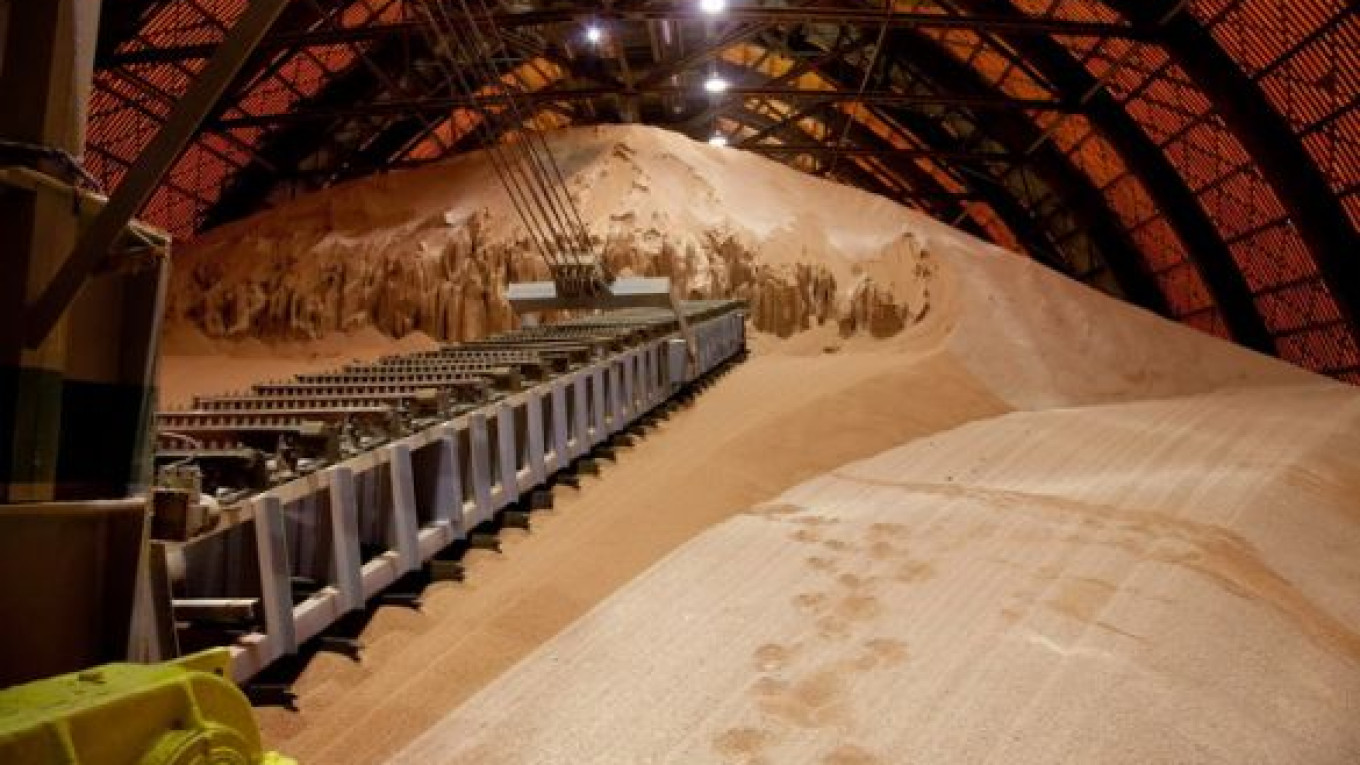As the worst drought in over 50 years grips the United States, driving corn prices to record levels amid fears of an imminent global food crisis, Russian fertilizer producers are eyeing a financial bonanza.
A string of investment banks have raised their ratings on Moscow-based fertilizer giant Uralkali and smaller players in the industry to "buy" in recent weeks as skyrocketing cereal prices prompt investors to seek a "potash play."
The MICEX Index has lost 5.3 percent of its value since the start of the year, but shares in Uralkali, which is controlled by billionaire tycoon Suleiman Kerimov, have risen by more than 10 percent to date, touching a -month high last week.
There is a traditional relationship between the price of corn and the market value of potassium- and phosphate-based fertilizer producers. Demand rises as grain farmers who have not seen their crops devastated anticipate a rise in profits on the back of high prices. Their excess cash makes fertilizers more affordable.
"As a rule, when corn futures rise [international traders] look at fertilizer companies," said Mikhail Pak, an analyst at Moscow brokerage Aton.
While the U.S. Midwest has been ravaged by high temperatures and little rainfall, the price of corn has surged more than 55 percent since early June. There is little to suggest that the momentum this has imparted to fertilizer equities is due to slacken.
Other Russian firms benefiting include phosphate-based fertilizer producer Phosagro, which raised $538 million in a London initial public offering last year, and the nitrogen fertilizer manufacturer Acron.
Agricultural developments in Russia itself have contributed to spiraling international concerns about food supplies that are driving the fortunes of fertilizer producers.
Last week the Agricultural Ministry downgraded its forecast for the grain harvest from 85 million tons to 80-85 million tons.
Some analysts are predicting that Russia may even introduce a moratorium on grain exports similar to the one put in place in August 2010 as the Kremlin battled to contain domestic price rises during a severe drought.
A grain export ban is "likely" and the harvest could turn in as little as 66 million tons this year, said Bank of America Merrill Lynch in a report to investors Monday. Annual internal consumption is estimated at about 72 million tons.
The weather for grain is expected to be "worse than the multi-year average" in some parts of the Urals and western Siberia, according to a statement on the Federal Hydrometeorological Center website Monday.
The Orthodox Church and local Emergency Ministry officials gathered in Omsk on Sunday to hold a prayer vigil aimed at relieving the area's drought, HYPERLINK "http://vzglyad.ru/"Vzglyad.ru reported.
The Russian harvest will be between 83 million and 85 million tons, vice president of the Russian Grain Union, Alexander Korbut, told The Moscow Times. There are unlikely to be any significant changes to this, he added, "but there are always risks."
The National Union of Grain Producers warned Friday that domestic prices were rising as harvest predictions were cut and prices climbed worldwide.
Even if the Russian harvest holds up, however, the tightening global market is likely to continue to benefit fertilizer producers.
There is a time lag of between three and six months between corn price rises and the impact on the price of potassium-based fertilizers, said Yelena Sakhnova, an analyst at VTB Capital.
Volatility in Uralkali's share price is likely to recede by late September and be further boosted by the signing of supply contracts with China later this year and rising demand expected in 2013, she added.
Following its 2010 merger with Silvinit, Uralkali became the largest potash producer in the world, accounting for about 20 percent of international output. Its exports reach all corners of the earth, including many European countries, China, India, Brazil and the United States.
The global mining and distribution of the potassium-laced mineral is controlled by an oligopoly of huge companies, which leaves significant pricing power with the suppliers of the mineral.
Uralkali outperformed the MICEX Index on Monday in the face of downward pressure on stocks generated by the European financial crisis. The potash miner closed down 2.68 percent at 265.28 rubles while the MICEX Index was down three percent.
A Message from The Moscow Times:
Dear readers,
We are facing unprecedented challenges. Russia's Prosecutor General's Office has designated The Moscow Times as an "undesirable" organization, criminalizing our work and putting our staff at risk of prosecution. This follows our earlier unjust labeling as a "foreign agent."
These actions are direct attempts to silence independent journalism in Russia. The authorities claim our work "discredits the decisions of the Russian leadership." We see things differently: we strive to provide accurate, unbiased reporting on Russia.
We, the journalists of The Moscow Times, refuse to be silenced. But to continue our work, we need your help.
Your support, no matter how small, makes a world of difference. If you can, please support us monthly starting from just $2. It's quick to set up, and every contribution makes a significant impact.
By supporting The Moscow Times, you're defending open, independent journalism in the face of repression. Thank you for standing with us.
Remind me later.


